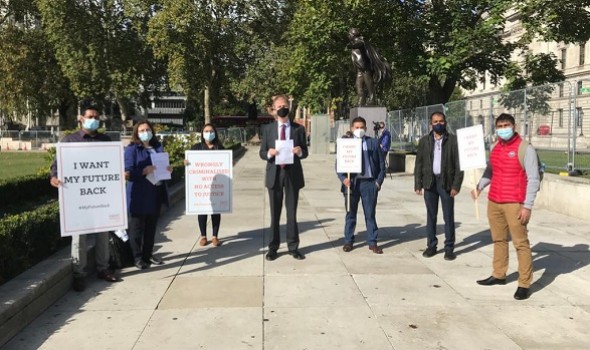The Home Office must right its wrongs after Newsnight revelations
The Home Office must right its wrongs after Newsnight revelations

FRIDAY 11 FEBRUARY, 2022
The BBC Newsnight investigation broadcast on 9 February into the expulsion of tens of thousands of overseas students is a decisive moment in the #MyFutureBack campaign to clear the students’ names.
The investigation cast serious doubts on key parts of the evidence used by the government to justify its mass expulsions in the wake of a 2014 BBC Panorama programme report of allegations of cheating in two privately run test centres for English-language skills.
That alone is sufficient to collapse the Home Office’s refusal to confront one of the biggest scandals in recent decades.
But the new evidence also shows that the Government has continued its clampdown on allegedly offending students even though it knew of serious concerns about flaws in the evidence and in its own conduct.
It also puts the spotlight on the extraordinary way that the US company responsible for the centres was given the job of assessing allegations of cheating – essentially marking its own homework.
For years, wronged students were not given the right to appeal. Initially they were unable to see the evidence on which they were condemned. When it finally became available, most had been deported or were living in Britain (in penury because they felt they could not go home until they had cleared their name), barred from renting accommodation, working, studying or access to health services. They were also faced with the barrier of legal fees often amounting to tens of thousands of pounds.
All this is unjust and shocking. It is also unBritish. In the words of Raja Noman Hussain (Nomi), one of the students whose life has been wrecked by this protracted denial of justice: “I have never expected such treatment and injustice from the United Kingdom. We were treated like criminals without even giving us a chance to prove our innocence.”
“Basic British rules of justice were almost entirely overlooked,” was the judgement of Stephen Timms, a Labour MP, who, like Migrant Voice, was quick to see that the government’s obfuscation – probably influenced by its own ‘hostile environment’ policy towards migrants – obscured an egregious wrong.
Mr Timms asked an urgent question in the House of Commons in response to the Newsnight programme. Ten MPs spoke out about the issue and shared our calls for justice and our demands to implement a simple, clear process for the students to get justice.
The campaign by the students and by Migrant Voice has already achieved much. Through demonstrations and helping and encouraging media coverage, we have put the campaign in the public eye, taken it into Parliament, seen the establishment of an All Party Parliamentary group, involved lawyers, contributed to high-level official investigations and reports.
But there is a toll on the individual students. The pressures have led to emotional stress, relationship breakdowns (how can we ever forget the student who told us that his father could not believe Britain could have behaved dishonourably so it was up to the son to stay until he had cleared his name) and mental illness.
For all these reasons, the Newsnight programme must be a turning point. The Government must grasp its legal and moral obligations, and its sense of equity, and establish a fair, low-cost way out of this miserable morass.


